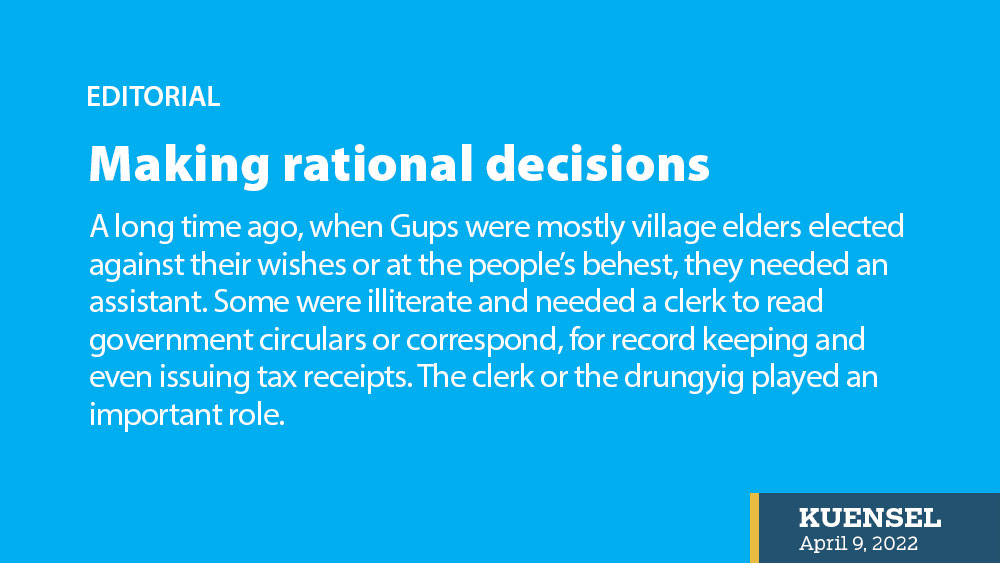A long time ago, when Gups were mostly village elders elected against their wishes or at the people’s behest, they needed an assistant. Some were illiterate and needed a clerk to read government circulars or correspond, for record keeping and even issuing tax receipts. The clerk or the drungyig played an important role.
Times have changed and so has local government. There were discourse if there should be an academic qualification criteria to contest for the Gup’s post. We didn’t have to. The local government today is headed by university graduates and assisted by mangmis and tshogpas – many who completed higher secondary school.
In this context, the government doing away with the post of gaydrungs is a major change at the LG level. The 205 Gaydrungs will not have jobs from next month, but in striving to streamline public service delivery, the civil service commission’s decision is logical keeping up with changes in the overall governance system.
If the decision is based on the relevance of gaydrunsg in today’s context, the post has become redundant. The gaydrungs, according to Gups, play an important role in collection of rural taxes and insurance. Information technology has made this role irrelevant. Some villagers file taxes online even if they have to use their relative in Thimphu. If the gaydrungs are aggrieved, they should be with the LG for not finding a relevant role for them or engaging them to improve LG.
It is a tough decision for the elected government under pressure from rising unemployment. But the issue should be looked beyond making 205 people jobless.
The local government is the closest government to the people, if not the most important. How villages, chiwogs and gewogs develops depend on the LG. They determine how government policies and plans succeed or fail at the grassroots level. What they need is leaders who can bring changes through innovation, leadership and make a difference.
The decision is also based on the larger scheme of governance to keep pace with new developments. The LGs could be the harbinger of change. The change in the profile of the Gup is already encouraging. With more and more educated, well- exposed and experienced people manning LGs, they will come with plan and priorities. When it comes to human resources, some gewogs should have more engineers, architects, chartered accountants, IT experts if they are to bring changes. If the recent decision is for this purpose, we should welcome it.
For the gaydrungs, they should leave the job with a vast experience. Not many get to serve the people at the village level or get to learn from them. The government has stated that it would assist the gaydrungs to stir up private ventures at grassroots level. The One Gewog One Product initiative, contact farming and policies like import substitution opens a vast opportunity if they have known the potential of gewog they served.
Meanwhile, the RCSC rejection of the proposal to retain gaydrungs on consolidated contract is an encouraging sign. The RCSC as a constitutional body asserted on what is right. Elected governments could be blinded by populist decision. Unemployment is a problem and relieving 205 people who were recommended by Gups for another term is a hard decision. The RCSC who is in the reform mood stood by its decision and convinced the government.
A lot of decisions when not popular change with governments. The gaydrung or the drayang closure could come back with a new government. The commission should stand by what is right in the interest of the nation and should not stoop to political pressure.


